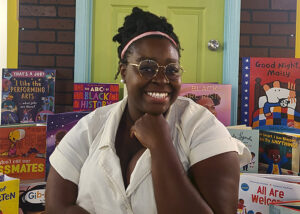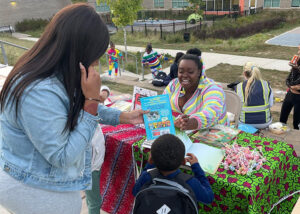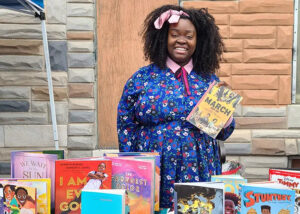As a general rule, when my wife Diane tells me to do something, it’s wise to do it. First, she’s typically right. Second, well, she’s very convincing. A while ago, she suggested I profile a Baltimore librarian named Araba Maze. Diane gave me her Instagram handle—@storybookmaze—and off I went to see what had enthralled her. That same day I reached out to Araba. Her dynamism, passion, and mission blew me away.

Araba Maze
Five years ago, Araba Maze was sitting on the stoop of her childhood home in East Baltimore. As in her youth, the narrow rowhouse stood amidst an impoverished, inner-city neighborhood that could be rough-and-tumble on one block, and perfectly safe on the next. The closest thing to a grocery store was the corner shop. Abandoned houses (or “bandos”) dotted the streets, centers for drug and gang activity. John Hopkins Hospital was nearby, its stone edifice a reminder of a not-too-distant past when the surrounding residents, mostly people of color, had been used as test subjects in medical experiments. One resident from the 1950s told Rebecca Skloot, author of The Immortal Life of Henrietta Lacks, “When it got dark and we were young, we had to be on the steps, or Hopkins might get us.”
Gathered around Araba on the stoop that fateful summer day were several of her nieces. They were avidly listening to her read aloud from a book by Walter Moseley. Soon enough, several neighborhood kids started to circle around her as well.
“Little heads kept popping up over the book I was reading,” Araba recalls. “I asked them if they wanted to join us and they shook their heads, yes. I switched to a more age-appropriate book. After I was done with it, they wanted another. Then another.”
Finally, Araba had to go. They pleaded for her to stay, just one more.
“Why don’t you go home and read?” Araba asked the kids.
“We don’t have any books at home,” one answered.
Araba was embarrassed at the response. Although her own home always had books, she had grown up in this neighborhood and felt like she should have known of the dearth of books in most households.
The next week she returned to the stoop and read another round of stories. Then the next week and the next. Occasionally kids in the neighborhood would knock on her family’s rowhome door and ask if she had any books they could borrow.
From this weekly routine, the seed of an idea—and mission—was sowed.

Araba was born and raised in a large family in Baltimore. Although the neighborhood suffered from crime and poverty, Araba remembers it fondly, especially the visits to the corner store to buy candy. “I thought it was a magical place. As for the broken glass on the street, for me, it was like really pretty glitter.”
“There were a lot of kids in the house,” Araba says. “It was fun. There was always something going on, though it also felt sometimes like you’re living in a daycare.” Books and education were important in the house.
The library was one of Araba’s happy places. Every summer Araba and her siblings participated in the reading program. She remembers well the celebration of Black History Month and Kwanza. It was also the first place that she had access to a computer. “I loved the joy and ease of going to the library.”
But Araba also experienced the barriers that libraries put up for families like her own. There were fines for books not returned on time, which given their big, often chaotic, household, was often the case. They didn’t have enough money to meet the costs. Instead, they participated in programs to “read your fines away” so they could check out more books.
Although Araba learned to read early with help from her mother, she struggled in grade school when the texts became more complicated. “I was at a loss to the extent where I was tested to see if I had dyslexia, which it turns out I did not. I just started to hate reading. The problem was that I was given books that I didn’t want to read and that were beyond my actual reading comprehension. They started putting me in the lowest level of classes. I felt terrible.”
In eleventh grade, her high school placed Araba in a special reading class. She was 16. After a few weeks of at-home reading assignments that weren’t getting through to the class, her teacher came into the room, sat down on the desk, and started reading Pride and Prejudice out loud. “We were basically doing storytime, and I was able to take in the text this way. Oh, I thought, this is what’s inside these books. This is what I was missing. Pretty soon I was reading ahead of the class to know what’s gonna happen next and that opened up the whole world of books to me.”
Upon graduation, Araba went to a nearby college, but it was not the right fit. She transferred over to Bowie State University, Maryland’s oldest HBCU (Historically Black Colleges and Universities). “That was great,” Araba says. “I just flew through school. It was like a family there, magical, and my professors were like my aunts and uncles. I got my bachelor’s degree in English with a minor in Spanish. I was going to be a writer, a poet—and I figured I might just teach for financial reasons.”
After Bowie State, Araba intended to study for her master’s in English. She had just won a poetry award for $5,000 that would go to her tuition. Some family difficulties left Araba uncertain of her direction. “I didn’t know who I was. I was totally lost. That was my lowest point.” Instead of pursuing her masters, Araba decided to teach in Spain, using the money from the award to fund her travel. “It was a good escape.”
Then she returned to Baltimore, the city she loved so much. Araba calls it the “Little Big Town.” She likens it to the bar in Cheers, “It’s a big city, but everyone knows your name. People are active in their communities. They still go to the local town hall. They want to make the city better.”
After that early summer reading to her nieces and a gaggle of other kids, Araba decided to devote herself to the same. She was on the path to becoming what she later called: a radical street librarian. “Radical” for her passion and willingness to do whatever it takes to get the right books into the hands of readers. “Street” for meeting people where they are, whether it’s on the corner block or at the laundromat.
Becoming an actual librarian was her first step. Traditionally, one would study for a master’s in library science. That route was too expensive. Instead, Araba started out with a “storytime” position in Baltimore County. She traveled to different libraries and neighborhoods, reading books aloud as she had on her old stoop. She also helped kids find books that met their reading skill level—and that they enjoyed.
From there, Araba obtained a library position at a local college, doing cataloging and operations. This led to a full-time position in a neighboring county. She enjoyed the community at each of the libraries, including the staff, elderly patrons who often came in simply to ward off loneliness, and, of course, the children. But Araba missed daily storytime. “That was my jam,” she says.
With COVID shuttering library doors throughout the city, Araba felt even further removed from her original intention to reach kids. “We were like pizza delivery people,” she recalls. “We’d bring books to the curbside and wave ten feet away. I hated that. It’s not community, and there was definitely no storytime.”
Araba questioned her role as a librarian. She wanted to be back in the street, doing outreach, and directly impacting her community. More specifically, she wanted to address one of the biggest issues facing children in neighborhoods like hers. That was “book deserts”.
Unite for Literacy, a non-profit devoted to promoting reading, defines a “book desert” as a geographic area lacking available books and other reading materials. In some wealthier areas of Baltimore, 80% of homes have more than 100 books in each household. In poor areas, that percentage can be as low as the single digits. A shortage of books in homes has been shown to negatively impact student literacy–and this obviously affects their overall education.
“We know that if children are not reading on-level by third grade,” Araba says, “they are more likely to end up in prison or impoverished or unemployed as adults.”
For Araba, it is not only the lack of access to books that challenge children, but also a lack of the right kind of books for the communities in which she worked and lived.
“Book choice is so important…If I look at a wall of books, and I don’t see anything that looks like me, then I might not read them. Kids often need to see themselves, lives like their own, communities like their own, on the covers to get them to open a book. They really bond with things that represent their own experiences, whether it’s dealing with the police or losing a family member, the things that happen around them in an urban setting. Also, the books need to be at the right level. For me, when I was a kid, I needed a low reading level with high-interest topics with a lot going on. Then there are languages, too. We’ve seen more immigrants in our communities and sometimes the parents aren’t literate in English, so it’s hard for them to tell the story to their children.”
In 2021, Araba committed fully to the mission that was first seeded on her East Baltimore stoop. She quit her full-time librarian position to start collecting books and distributing them for free in satellite book nooks that she built and placed in underserved areas like corner stores, barber shops, doctor’s offices, parks, and the like. To pay her bills, she started driving for Uber Eats and taking part-time library work when she could.

After hearing of a United Way of Maryland contest called the “Changemaker Challenge,” Araba submitted her idea to set up vending machines with free books instead of snacks around Baltimore’s book deserts.
“The machines create an excitement, a thrill that they are curating their own home libraries. And so, they develop a personal relationship with those books and bond over them. So that way they develop into lifelong readers and pass that down to their children.”
To promote her idea, Araba marshaled her savvy social media skills to create a TikTok video explaining her mission. It went viral—and, arguably, helped her win the contest. Soon enough, Araba was taping an episode of Good Morning America and receiving a thousand books from Disney Publishing to distribute.
No doubt the attention and accolades have accelerated Araba’s mission battling book deserts, but her daily role as a Radical Street Librarian remains the same, getting the right book into the right hand to help kids read—and thrive.
—–
Follow Araba on Instagram
For more wonderful stories like this one, visit Work/Craft/Life
Photos courtesy of Neal Bascomb







